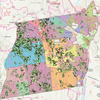Why do some town courts use their own prosecutors? And is it a benefit?
ALBANY COUNTY — Of the 18 municipalities in Albany County, a dozen use the county to prosecute Vehicle and Traffic cases while the rest hire their own attorneys, according the Cecilia Walsh, spokeswoman for the Albany County District Attorney’s Office.
The fees collected for traffic fines are divided among the state, the county, and the municipality, though the amount received by municipalities vary. For example, nearly half of the fees in Guilderland went to the town, while both Colonie and Westerlo took 40-percent of the total for their town funds.
Some towns say there is no financial benefit to hiring a prosecuting attorney while other towns believe that hiring their own lawyer, rather than using the county’s, pays off despite having to pay for the lawyer.
Walsh surmised that the benefit a town might derive by paying its own attorney — rather than using one from the district attorney’s office, paid for by the county —would be in how quickly a town would receive funds.
“They staff less people or have less work for their staff,” she said. “So they’re able to retain the resources back in a more expedient timeline.”
A Westerlo official said the financial benefit lies in plea bargaining, where a town prosecutor is more likely to strike a deal that would financially benefit the town.
In 2017, Colonie collected the fourth largest amount of traffic fees in the state — over $2 million— with Guilderland close behind at number eight, collecting$1.6 million.
Statewide, the municipalities that collect the most in traffic fines are those located along the Thruway. Topping the list is Amherst, outside of Buffalo, which collected $ 3.4 million in 2017.
In Colonie, two part-time town attorneys are used to prosecute traffic crimes up to a misdemeanor level, said town attorney Michael Maggulli. According to Maggulli, the town does not benefit financially for hiring its own attorneys, but does so because the town is charged with enforcing its local arrest for the state’s Vehicle and Traffic Law, he said.
Guilderland’s town attorney, James Melita, also serves as the town’s prosecuting attorney for traffic violations, said court clerk Jennifer Stephens. Supervisor Peter Barber said that the attorney prosecutes on behalf of town departments like its police force. Nearly half the fees prosecuted in Guilderland go to the town.
Two of the Helderberg Hilltowns, Knox and Berne, each with a population about a tenth of Guilderland’s, and located nowhere near the Thruway, do not pay their own lawyers but rather use an assistant district attorney to prosecute traffic cases.
In Knox, an assistant district attorney from the county serves as the prosecutor for town court on the first of the month, said Knox Town Justice James Corigliano. Any violations of local ordinances, however, are prosecuted by the town attorney, he said.
The town of Berne uses an attorney provided by the district attorney’s office to prosecute all cases, said town attorney William Conboy in a voice message to The Enterprise.
New Scotland also does not use its own attorney for traffic cases, but instead has an assistant district attorney from the county prosecute, said the town’s court clerk, Patricia Thompson. But the town, despite not employing its own attorney, receives a portion of the fines issued at a similar rate as Colonie.
The other two Hilltowns, Rensselaerville and Westerlo, do hire their own prosecuting attorneys.
Rensselaerville employs a prosecuting attorney, said town Judge Muriel Frasher, only for traffic crimes under the level of a misdemeanor. The town uses a different attorney than the town attorney to prosecute these crimes, but both are from the same law firm — Tabner, Ryan & Keniry.
At its annual reorganizational meeting, the Westerlo town board reappointed Aline Galgay as its prosecuting attorney although she did not want to continue as Westerlo’s town attorney. As prosecuting attorney, she is paid $600 per court session.
William Bichteman, a former town councilman who was appointed the deputy supervisor at the same meeting, said said that the town has used a prosecuting attorney in the traffic court for about three or four years.
Westerlo, with a population of about 3,400, brings in around 2-percent of what larger towns like Guilderland, with a population of about 35,300, and Colonie, with about 81,600 residents, collect in traffic fines. Westerlo collected about $41,000 in fees in 2017. Bichteman said hiring an in-house attorney brings Westerlo a larger portion of fees than it would garner using a county attorney.
Bichteman said that the financial benefit lies in plea bargaining, where a town prosecutor is more likely to strike a deal that would financially benefit the town.
According to an August 2010 report from the Albany County Comptroller’s Office, town justices have little ability to reduce the penalty if someone is convicted of their original charge, but justices are able to accept a plea to a lesser charge, such as amending a speeding ticket to a parking violation. Fines imposed for parking convictions are distributed to municipalities, as well as fines for failure to obey a traffic-control device.
According to the 2010 report, towns and villages collected about $23 million in additional fines for parking and traffic-signal plea deals, while the state, which generally does not collect surcharges or fees for such violations (although the state does collect surcharges and fees for convictions of failure to obey a traffic-control device), may have lost between $30 million and $40 million in revenue.
Who gets what?
The collection of fines is complicated; who collects depends on what law is violated. According to the comptroller’s 2010 reports, towns with small populations and few local ordinances are often unable to collect as much revenue as villages or cities.
Towns also often have violations in which the fines must be distributed to the state, such as certain vehicle and traffic violations. Villages are also able to collect more revenue because they often have denser populations and may have more penal offenses or other offenses that have locally-collected fines. Villages are also more likely to enact local ordinances.
According to the report, unless there is a law that says otherwise, a fine imposed by a village or town court is collected by that village or town. This includes not only fines for violations of local ordinances, but also state statutes like the penal law.
However, villages are not eligible to receive vehicle and traffic fines if they do not have their own court, despite otherwise being able to receive fines for violating local ordinances; these are distributed to the town.
Towns and villages are not able to collect fines for violating certain vehicle and traffic laws such as those related to equipment, inspections, dimensions and weights, licenses, registration, insurance, certain instances of speeding, reckless driving, and speed contests; the state collects fees for these violations, according to the report.
Revenue for some violations such as snowmobile license violations is divided between the municipality and the state. Counties receive fines for a few specific offenses such as driving while intoxicated.
Some fines for speeding are distributed to a municipality while others are distributed to the state, depending on where the violation occurred, with the state receiving fines for incidents on most state-regulated roads. But towns and villages receive fines for violations on a state parkway or within a state park, according to the report.
Larger municipalities that are able to enact their own speed limits are able to collect fines from speeding within these locally-enacted limits, but the amount is capped at $5 per capita a year, and excess fines are distributed to the state.
Villages without a court may collect fines for violating a village speed limit up to their own annual fine cap. In 2004, for example, when a new state budget policy deemed speeding fines would go only to the state, towns like Guilderland enacted their own local ordinances against speeding so that they could still collect the fines.
Mandatory surcharges distributed to the state are also assessed on certain violations of the Environmental Conservation Law, the Penal Law, and the Vehicle and Traffic Law, the report says. Some laws also require that state fees are added for state programs like crime victim assistance, DNA databanks, and sex-offender registration.


